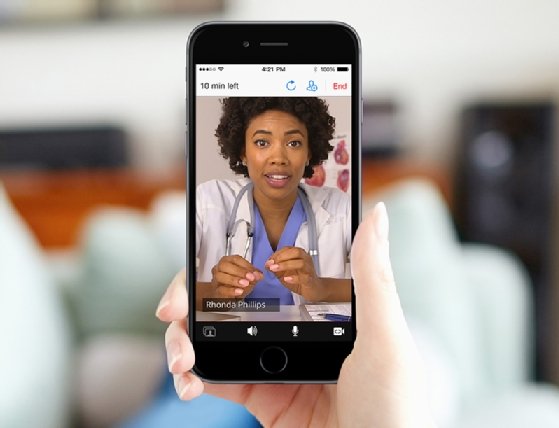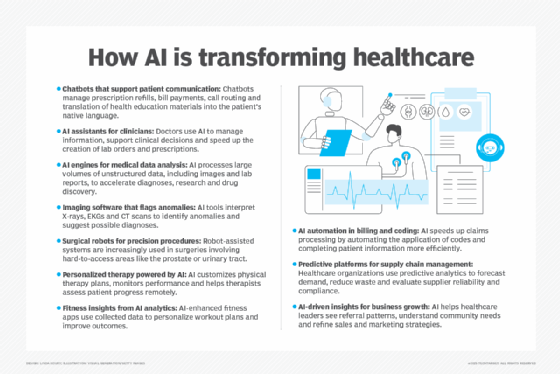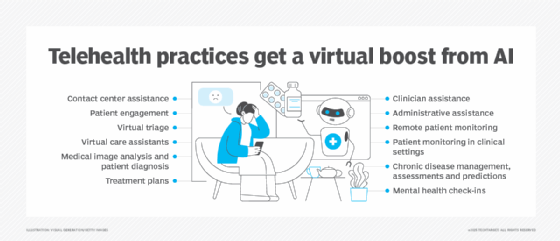How AI is changing telemedicine in 2025
AI is virtually expanding, reshaping and personalizing telehealth practices in triaging, image analysis, patient diagnoses, treatment planning, monitoring and mental health.
As the healthcare sector increasingly adopts artificial intelligence systems and tools, telemedicine is realizing AI's benefits across numerous applications, including administrative and clinical assistance, medical image analysis, virtual triaging, diagnostics, chronic disease management, mental health check-ins and patient monitoring.
The percentage of physicians using AI jumped from 38% in 2023 to 66% in 2024, according to an American Medical Association (AMA) survey released in 2025. Telemedicine, or remote healthcare services delivered over telecommunications infrastructure, is among the areas of healthcare benefiting from AI's numerous capabilities. AI investments in telemedicine are growing at a strong clip. Dimension Market Research predicted AI telemedicine spending will grow 26% annually and surpass $156 billion by 2033.
As the number of healthcare interactions that qualify as telemedicine has grown, so too have the number of patient touchpoints that involve AI, according to Elizabeth Krupinski, director of the Southwest Telehealth Resource Center and associate director of evaluation for the Arizona Telemedicine Program. The breadth of use cases for AI in telemedicine has expanded in recent years, she added, pointing to anecdotal evidence that AI is enabling not only earlier medical intervention with patients in need of care but more frequent intervention as well. As a result, patients are receiving earlier, more timely care without hospitalization, added Krupinski, who is also professor and vice chair for research in the radiology and imaging sciences department of Emory University's School of Medicine.
AI use cases in telemedicine
Many of the computer technologies and digital tools used by clinicians and patients have built-in AI capabilities, making AI commonplace in healthcare settings and health-related interactions. AI is used in ICU command centers to analyze patient data and alert to crises. AI-driven tools monitor patients inside medical facilities and outside hospital walls. AI also helps clinicians triage patients, diagnose their conditions and plan optimal treatments.
This article is part of
AI in healthcare: A guide to improving patient care with AI
Contact center assistance
AI-powered virtual health assistants can improve patient engagement by handling scheduling, providing medication reminders and answering medical queries, all of which help reduce the administrative burden on healthcare providers, according to Jordan Anderson, director of digital solutions at financial advisory Baker Tilly U.S.
Patient engagement
Chatbots can provide information, schedule appointments and handle intake before clinical visits. "AI-driven chatbots can improve engagement with patients, help them to have better adherence to treatments and improve communication with providers," explained Dr. Joseph Finkelstein, professor and vice chair of clinical data science and telemedicine informatics at the University of Utah's School of Medicine.
Virtual triage
AI can be used to ask a remote patient for a list of symptoms and analyze the responses to determine whether the patient is a candidate for virtual or in-person care, Krupinski said. AI text and voice chat, Anderson added, can "elicit patient history [and] complaints and ask contextual questions to allow providers to optimize the time they spend on a video or voice call."

Virtual care assistants
"AI chatbots can … answer patient questions, provide guidance and schedule appointments with providers," Anderson explained. Beyond just text-based chat, he said, AI voice and video synthesis technology enables real-time voice conversations with a virtual care assistant. "AI can also break down language barriers," he added, "allowing the virtual agent to converse with patients in their preferred language, increasing patient engagement and interaction."
Medical image analysis and patient diagnosis
Using individual patient data and larger sets of historical data, AI helps clinicians interpret the results of medical imaging and reach a more accurate diagnosis. Doctors can then determine whether the patient can be properly treated at home, in a nearby clinic or in a hospital.
Treatment plans
AI can personalize an optimal course of medical intervention based on analysis of a patient's unique profile. Algorithms can analyze a patient's individual needs and medical history as well as account for the patient's preferences, such as type and location of treatment, to identify what treatments would be most effective for the patient, Finkelstein said.
Clinician assistance
Generative AI and voice-recognition technology can take commands from clinicians and initiate requested actions, such as summarizing notes or alerting other clinicians to a patient's healthcare needs, said Ed Ricks, managing director of digital solutions at Baker Tilly U.S.
Administrative assistance
Telehealth entities already are using AI to reduce the administrative burden associated with billing and claims, including maintaining data hygiene, handling duplicate records, correcting incorrect or incomplete information and automating workflows so healthcare staff can focus on more important tasks, Anderson said. Intelligent process automation tools, he noted, "allow back-office processes to be automated through the implementation of rules-based and AI-based agents handling administrative tasks."
Remote patient monitoring
AI can retrieve and analyze a patient's vital signs from blood pressure cuffs, heart monitors and other medical devices and alert the patient's doctor or nurse about any abnormal readings. Anderson said he expects this capability to be applied in remote patient monitoring. "We see this trend today with consumer wearable devices and expect AI models to become more sophisticated and accepted within the medical and regulatory communities," he added.
Patient monitoring in clinical settings
In clinical and acute care settings, Ricks noted, AI's telemedicine capabilities are assisting medical staff that might be shorthanded or overwhelmed by the number of patient admittances. AI can monitor a recovering patient trying to get out of bed and alert medical staff, act as a virtual nurse and interact with patients instantaneously, and assist nurses with documentation so they can focus on patient care. "In this case, the patient actually feels like they get better care because they have a nurse looking at them and not the computer," Ricks said, adding that nurses report they're less burdened with administrative tasks so they can spend more time with patients.
Chronic disease management, assessments and predictions
AI can help monitor a patient, provide feedback to the patient, predict whether the patient will suffer a health-related episode and alert to early warning signs of disease progression, Finkelstein said. AI could also be used to monitor patients and determine if they need to adjust their behavior or environment, such as modifying an exercise routine, to prevent a recurrent episode.
Mental health check-ins
Chatbots can check in with patients as part of their mental health treatment plan, Krupinski said. Chatbots can engage patients and ask them questions about their mood and mental state. Meanwhile, algorithms can analyze their answers as well as their vocal tones and facial expressions to advise patients or their clinicians whether medical intervention is needed.

Benefits and drawbacks of AI in telehealth
AI has received favorable reviews in the way it's reshaping many aspects of healthcare, including telemedicine. "AI presents a transformative force in healthcare, with the potential to enhance patient care, reduce errors and broaden medical knowledge," concluded a 2024 medical research report based on numerous peer-reviewed articles and studies.
AI helps predict, prevent and control various health risks and diseases; provides data-driven insights so clinicians can make better medical decisions; assists with surgical procedures; and supports mental health cases. Moreover, AI helps reduce costs, empowers patients and relieves practitioners' workloads. AI achieves much the same outcomes when applied to telemedicine:
- AI reduces the time clinicians and staff spend on administrative and general office tasks and increases the time devoted to virtual visits with remote patients.
- By collating, synthesizing and analyzing emergent data from multiple sources in near real time, AI can deliver data-driven insights clinicians can use to quickly and accurately convey the best treatment options to their patients.
- Using remote patient monitoring tools, clinicians can treat patients at home and in rural locations where there are few or no medical facilities.
- Algorithms analyze historical and patient data to determine optimal medical interventions and develop more personalized treatment plans, especially important for at-home patients.
- AI can continuously monitor patients remotely during their treatment regimens at home as well as manage chronic conditions and diseases.
When planning and implementing AI in telemedicine, the benefits can come with challenges. The AMA study revealed that 40% of responding physicians said they're just as concerned as they are excited about AI's use in healthcare, while 25% said they're more concerned than excited. Healthcare experts cited the following concerns:
- Healthcare organizations must make AI investments upfront without insurance reimbursement, Krupinski said.
- Organizations must ensure that patient data used by AI systems won't violate patient privacy rights or regulatory requirements.
- AI systems must be monitored and governed so their algorithms are trained on reliable and trustworthy data and stay within accepted accuracy and reliability standards.
- Clinicians might become so dependent on AI that they ignore their own training, skills, experience and instincts.
- AI tends to be perceived as a black box whose outcomes can't be trusted. "AI models," Finkelstein warned, "need to be developed so that they provide transparency."
- The introduction of AI into longstanding workflows and patient care procedures can be disruptive and engender resistance from clinicians and patients. "It's a different way of doing what they've done for years," Ricks said. "So, organizational change management is needed here."

The future of AI in telemedicine
Despite the challenges and concerns, healthcare providers and technology experts said AI adoption is increasing rapidly in healthcare and telemedicine.
A time could come when patients will have their facial expressions analyzed by AI-based systems to detect their emotions so clinicians can provide better mental and behavioral health services. Neurologists and physical therapists might use AI to remotely measure patient movements and track how a treatment plan is progressing. Patient intake functions could one day be performed by avatars. And AI systems might move beyond a support function and independently offer diagnoses.
While those scenarios could be years away, healthcare experts stress the need for ongoing AI governance to ensure that intelligent systems are -- and can remain -- accurate and reliable. "AI's penetration into the healthcare system isn't anywhere near where it's going to be in the next 10 to 15 years," Krupinski acknowledged. "That's when we will begin to see AI's true impact. … I think it's going to be positive, but we're in the growing pains stage."
Editor's Note: This article was updated in 2025 to reflect the latest AI developments and use cases in telemedicine.
Mary K. Pratt is an award-winning freelance journalist with a focus on covering enterprise IT and cybersecurity management.







